第44章 CHAPTER X THE SPIRIT Of CANADA(3)
I went across to Oregon a little while ago and saw something that opened my eyes. In a little school in the ranching country in a settlement of mixed foreigners--Swedes, Italians, Germans, Jews--they had a great show they called 'saluting the flag.' Being Scotch you despise the whole thing as a lot of rotten slushy sentimentality, and a lot of Canadians agree with you. But let me tell you how they got me. I watched those kids with their foreign faces, foreign speech--you ought to hear them read--Great Scott, you'd have to guess at the language. Then came this flag-saluting business. A kid with Yiddish written all over his face was chosen to carry in the flag, attended by a bodyguard for the colours, and believe me they appeared as proud as Punch of the honour. They placed the flag in position, sang a hymn, had a prayer, then every kid at a signal shot out his right hand toward the flag held aloft by the Yiddish colour bearer and pledged himself, heart, and soul, and body, to his flag and to his country. The ceremony closed with the singing of the national hymn, mighty poor poetry and mighty hard to sing, but do you know listening to those kids and watching their foreign faces I found myself with tears in my eyes and swallowing like a darn fool. Ever since that day I believe in flag-flapping.""Maybe you are right," replied Ross. "You know we British folk are so fearfully afraid of showing our feelings. We go along like graven images; the more really stirred up, the more graven we appear. But suppose we move over to the platform where the speechifying is to be done."In front of the school building a platform had been erected, and before the stage, preparations had been made for seating the spectators as far as the school benches and chairs from neighbours' houses would go. The programme consisted of patriotic songs and choruses with contributions from the minstrel company. The main events of the evening, however, were to be the addresses, the principal speech being by the local member for the Dominion Parliament, Mr. J. H. Gilchrist, who was to be followed by a local orator, Mr. Alvin P. Jones, a former resident of the United States, but now an enthusiastic, energetic and most successful farmer and business man, possessing one of the best appointed ranches in Alberta. The chairman was, of course, Reverend Evans Rhye. The parson was a little Welshman, fat and fussy and fiery of temper, but his heart was warmly human, and in his ministry he manifested a religion of such simplicity and devotion, of such complete unselfishness as drew to him the loyal affection of the whole community. Even such sturdy Presbyterians as McTavish, the Rosses, Angus Frazer and his mother, while holding tenaciously and without compromise to their own particular form of doctrine and worship, yielded Mr. Rhye, in the absence of a church and minister of their own denomination, a support and esteem unsurpassed even among his own folk. Their attitude was considered to be stated with sufficient clearness by Angus Frazer in McTavish's store one day.
"I am not that sure about the doctrine, but he has the right kind of religion for me." And McTavish's reply was characteristic:
"Doctrine! He has as gude as you can expec' frae thae Episcopawlian buddies. But he's a Godly man and he aye pays his debts whatever,"which from McTavish was as high praise as could reasonably be expected.
The audience comprised the total population of Wolf Willow and its vicinity, as well as visitors from the country within a radius of ten or fifteen miles.
Mr. J. H. Gilchrist, M. P., possessed the initial advantages of Scotch parentage and of early Scotch training, and besides these he was a farmer and knew the farmer's mind. To these advantages he added those of a course of training in Toronto University in the departments of metaphysics and economics, and an additional advantage of five years' pedagogical experience. He possessed, moreover, the gift of lucid and forceful speech. With such equipment small wonder that he was in demand for just such occasions as a Dominion Day celebration and in just such a community as Wolf Willow. The theme of his address was Canadian Citizenship, Its Duties and Its Responsibilities, a theme somewhat worn but possessing the special advantage of being removed from the scope of party politics while at the same time affording opportunity for the elucidation of the political principles of that party which Mr. Gilchrist represented, and above all for a fervid patriotic appeal.
With Scotch disdain of all that savoured of flattery or idle compliment, Mr. Gilchrist plunged at once into the heart of his subject.
"First, the area of Canada. Forty-six years ago, when Canada became a nation, the Dominion possessed an area of 662,148 square miles; to-day her area covers 3,729,665 square miles, one-third the total size of the British Empire, as large as the continent of Europe without Russia, larger by over one hundred thousand square miles than the United States.""Hear, hear," cried an enthusiastic voice from the rear.
"Aye, water and snow," in a rasping voice from old McTavish.
"Water and snow," replied Mr. Gilchrist. "Yes, plenty of water, 125,000 square miles of it, and a good thing it is too for Canada.
Some people sniff at water," continued the speaker with a humorous glance at McTavish, "but even a Scotchman may with advantage acknowledge the value of a little water." The crowd went off into a roar of laughter at the little Scotchman who was supposed to be averse to the custom of mixing too much water with his drink.